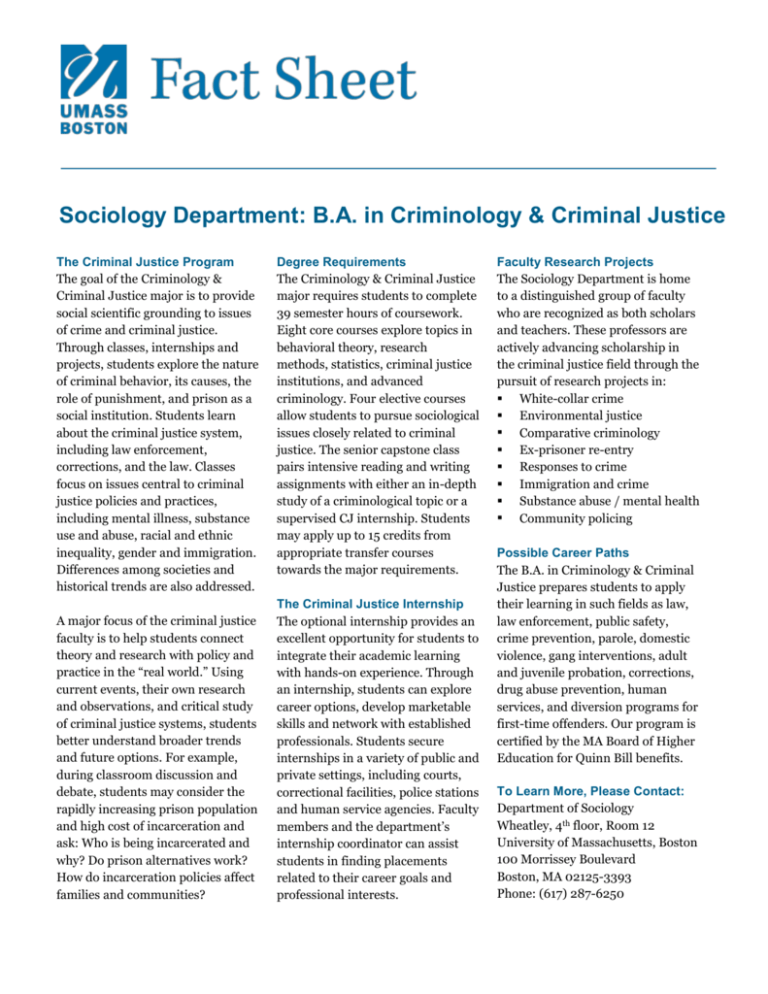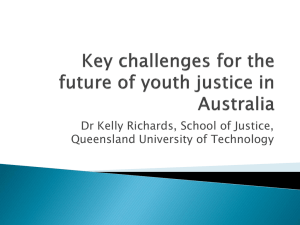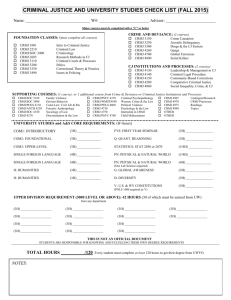Criminology and Criminal Justice Major Fact Sheet
advertisement

Sociology Department: B.A. in Criminology & Criminal Justice The Criminal Justice Program The goal of the Criminology & Criminal Justice major is to provide social scientific grounding to issues of crime and criminal justice. Through classes, internships and projects, students explore the nature of criminal behavior, its causes, the role of punishment, and prison as a social institution. Students learn about the criminal justice system, including law enforcement, corrections, and the law. Classes focus on issues central to criminal justice policies and practices, including mental illness, substance use and abuse, racial and ethnic inequality, gender and immigration. Differences among societies and historical trends are also addressed. A major focus of the criminal justice faculty is to help students connect theory and research with policy and practice in the “real world.” Using current events, their own research and observations, and critical study of criminal justice systems, students better understand broader trends and future options. For example, during classroom discussion and debate, students may consider the rapidly increasing prison population and high cost of incarceration and ask: Who is being incarcerated and why? Do prison alternatives work? How do incarceration policies affect families and communities? Degree Requirements The Criminology & Criminal Justice major requires students to complete 39 semester hours of coursework. Eight core courses explore topics in behavioral theory, research methods, statistics, criminal justice institutions, and advanced criminology. Four elective courses allow students to pursue sociological issues closely related to criminal justice. The senior capstone class pairs intensive reading and writing assignments with either an in-depth study of a criminological topic or a supervised CJ internship. Students may apply up to 15 credits from appropriate transfer courses towards the major requirements. The Criminal Justice Internship The optional internship provides an excellent opportunity for students to integrate their academic learning with hands-on experience. Through an internship, students can explore career options, develop marketable skills and network with established professionals. Students secure internships in a variety of public and private settings, including courts, correctional facilities, police stations and human service agencies. Faculty members and the department’s internship coordinator can assist students in finding placements related to their career goals and professional interests. Faculty Research Projects The Sociology Department is home to a distinguished group of faculty who are recognized as both scholars and teachers. These professors are actively advancing scholarship in the criminal justice field through the pursuit of research projects in: White-collar crime Environmental justice Comparative criminology Ex-prisoner re-entry Responses to crime Immigration and crime Substance abuse / mental health Community policing Possible Career Paths The B.A. in Criminology & Criminal Justice prepares students to apply their learning in such fields as law, law enforcement, public safety, crime prevention, parole, domestic violence, gang interventions, adult and juvenile probation, corrections, drug abuse prevention, human services, and diversion programs for first-time offenders. Our program is certified by the MA Board of Higher Education for Quinn Bill benefits. To Learn More, Please Contact: Department of Sociology Wheatley, 4th floor, Room 12 University of Massachusetts, Boston 100 Morrissey Boulevard Boston, MA 02125-3393 Phone: (617) 287-6250











